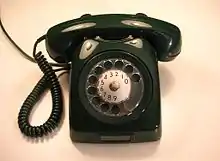telephone
English

A rotary-dial telephone
Etymology
First used by Alexander Graham Bell in 1876 to refer to the modern instrument, but previous devices had been given this name, which was borrowed from French téléphone. Ultimately from Ancient Greek τῆλε (têle, “afar”) + φωνή (phōnḗ, “voice, sound”).
Pronunciation
- (Received Pronunciation) IPA(key): /ˈtɛlɪfəʊn/, /ˈtɛləfəʊn/
- (US) IPA(key): /ˈtɛləfoʊn/
Audio (US) (file) Audio (file)
Noun
telephone (countable and uncountable, plural telephones)
- A telecommunication device (originally mechanical, and now electronic) used for two-way talking with another person (often shortened to phone).
- (Canada, US, uncountable) The game of Chinese whispers.
Synonyms
- blower, phone, farspeaker, Ameche (slang), dog and bone (slang), horn (informal)
- See also Thesaurus:phone
Hyponym
Derived terms
Terms derived from telephone (noun)
Translations
a device used for two-way talking with other people
|
|
Chinese whispers — see Chinese whispers
Verb
telephone (third-person singular simple present telephones, present participle telephoning, simple past and past participle telephoned)
- (transitive, intransitive) To (attempt to) contact someone using the telephone.
- 1913, Robert Barr, chapter 4, in Lord Stranleigh Abroad:
- “I came down like a wolf on the fold, didn’t I ? Why didn’t I telephone ? Strategy, my dear boy, strategy. This is a surprise attack, and I’d no wish that the garrison, forewarned, should escape. …”
-
Synonyms
- call, drop a line, phone, ring
- See also Thesaurus:telephone
Translations
to call someone
|
|
Anagrams
This article is issued from Wiktionary. The text is licensed under Creative Commons - Attribution - Sharealike. Additional terms may apply for the media files.